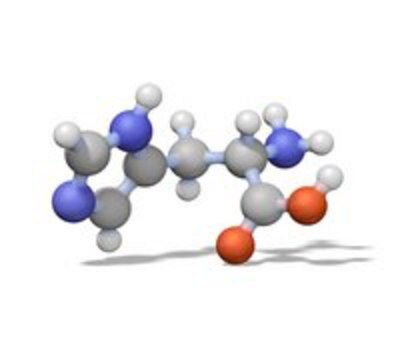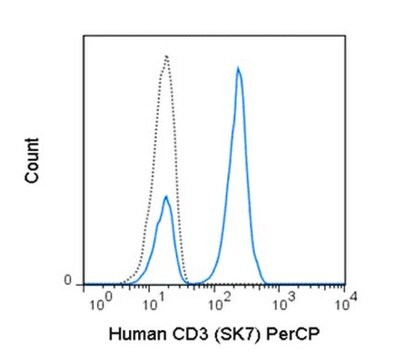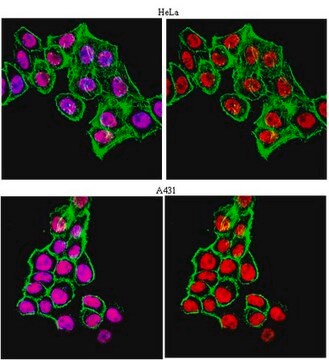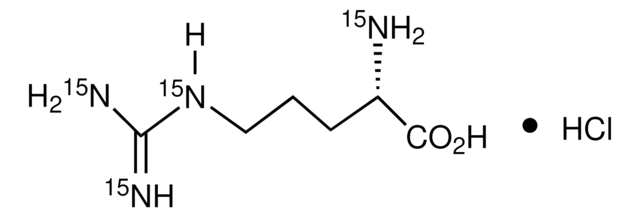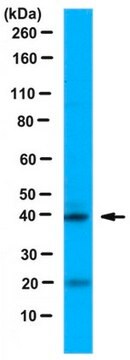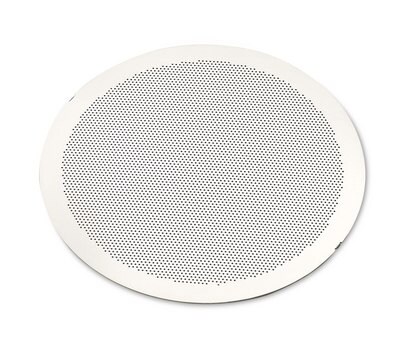05-988
Anti-Pras40 Antibody, Clone 73P21
clone 73P21, Upstate®, from mouse
Synonim(y):
40 kDa proline-rich AKT substrate, AKT1 substrate 1 (proline-rich), proline-rich Akt substrate, 40 kDa
About This Item
Polecane produkty
pochodzenie biologiczne
mouse
forma przeciwciała
purified immunoglobulin
rodzaj przeciwciała
primary antibodies
klon
73P21, monoclonal
reaktywność gatunkowa
human
producent / nazwa handlowa
Upstate®
metody
immunoprecipitation (IP): suitable
western blot: suitable
izotyp
IgG1
numer dostępu NCBI
numer dostępu UniProt
Warunki transportu
wet ice
docelowa modyfikacja potranslacyjna
unmodified
informacje o genach
human ... AKT1S1(84335)
Opis ogólny
Specyficzność
Immunogen
Zastosowanie
Epigenetics & Nuclear Function
PI3K, Akt, & mTOR Signaling
Jakość
Western Blot Analysis:
A 0.1-1.0 µg/mL dilution of this lot detected PRAS40 in RIPA lysates of HeLa cells.
Opis wartości docelowych
Postać fizyczna
Przechowywanie i stabilność
Handling Recommendations:
Upon first thaw, and prior to removing the cap, centrifuge the vial and gently mix the solution. Aliquot into microcentrifuge tubes and store at -20°C. Avoid repeated freeze/thaw cycles, which may damage IgG and affect product performance.
Komentarz do analizy
RIPA lysates of HeLa cells.
Inne uwagi
Informacje prawne
Oświadczenie o zrzeczeniu się odpowiedzialności
Nie możesz znaleźć właściwego produktu?
Wypróbuj nasz Narzędzie selektora produktów.
Kod klasy składowania
12 - Non Combustible Liquids
Klasa zagrożenia wodnego (WGK)
WGK 2
Temperatura zapłonu (°F)
Not applicable
Temperatura zapłonu (°C)
Not applicable
Certyfikaty analizy (CoA)
Poszukaj Certyfikaty analizy (CoA), wpisując numer partii/serii produktów. Numery serii i partii można znaleźć na etykiecie produktu po słowach „seria” lub „partia”.
Masz już ten produkt?
Dokumenty związane z niedawno zakupionymi produktami zostały zamieszczone w Bibliotece dokumentów.
Nasz zespół naukowców ma doświadczenie we wszystkich obszarach badań, w tym w naukach przyrodniczych, materiałoznawstwie, syntezie chemicznej, chromatografii, analityce i wielu innych dziedzinach.
Skontaktuj się z zespołem ds. pomocy technicznej